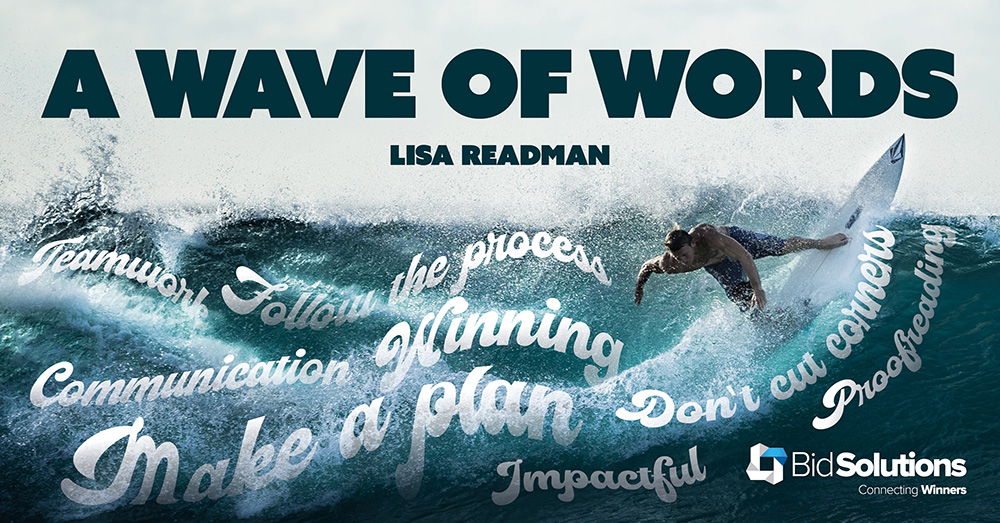
In a busy market, bids come in thick and fast like waves to the shore. Choosing the right bid (or the right wave) takes patience and knowhow. You have to check the conditions (market or weather). You have to be prepared at all times (bid team ready or board waxed). To succeed, you need to make an impact. The words in your bid need to make you stand out, like the surfer with the brightest wetsuit on the beach.
I am passionate about words. As a bid writer, proofreader, copy editor and former Lloyds of London underwriter, words are my lifeblood. When I listen to songs, I hear the lyrics before the music. I embody Jasper Fforde’s team slogan in his Thursday Next book series: “Wordage is my business; grammar is my game.”
I know this is not a widely shared passion. SPAG (spelling, punctuation and grammar) strikes fear into the hearts of many – but we shouldn’t lose sight of its value in a “winning” business context. In a professional setting, poor language skills can taint your company’s credibility and impact how your brand is received.
In her article “Yes, Good Grammar Is (Still) Important, and Here’s Why”[1], Megan Krause defines good grammar as a brand ambassador. She writes, “It doesn’t matter if you’re talking about your personal brand or your business brand – your grammar, spelling and punctuation represents you in the world. It sends the reader a message about your authority and attention to detail. It’s a trust signal; it says, I do good work. You can feel safe hiring me/buying from me/retaining my services. Conversely, poor grammar harms your credibility and makes you look careless.”
I agree wholeheartedly. So do most of the bid teams I work with – in theory at least.
If I ask a bid team if it’s important for their document to be spelled and punctuated correctly, tell a clear story and engage the review panel, they’ll emphatically say, “Yes!” Then comes the realisation they have to allow time for proofreading and editing in the bid timetable. And the emphatic “Yes” often turns to “Maybe…” and occasionally turns to “No, we don’t have time.”
I’m sorry…what?
Cutting corners by eliminating proofreading/copy editing may seem justifiable when bids are coming one after another, like a wave set on the California beaches I used to call home. But it is short-sighted and this is why.
Your written submission needs to provide concise and impactful responses to the tender questions. It needs to clearly lay out your solution and why it will work. A woolly response gives the client no confidence. It can also create a legal minefield as clients are increasingly incorporating written submissions into contract terms and conditions.
In addition, your written response should reflect the client’s own ‘tone’. Once you identify the language they use to promote themselves, you can mirror their approach in your response – but without compromising on good grammar. Formal language can seem confusing or even archaic but it provides a framework for clearly demonstrating competence to your client. It cannot be replaced by informal language in the business world.
Here are some key actions (which, as we all know, speak louder than words) for consistently incorporating proofreading/copy editing into every bid:
- Build a minimum number of days into your bid timetable for proofreading and editing (a loose estimate is one day per 50 pages)
- Be clear on what you expect your proofreader/copy editor to do. Are they only checking for SPAG issues or are they also reviewing your response to see if (or how well) you’ve answered the client’s questions? Confirm whether words in charts, graphics, tables or images should be included in their review.
- Keep the proofreader/copyeditor in the loop! Whether an in-house team member or an outsourced specialist is providing the service, give as much notice as possible if there will be a delay in completing the written submission. Just because you’ve built a buffer for slippage into your bid timetable doesn’t mean they have.
- When you get the proofed/edited version back, don’t just click “Accept All Changes”. The suggested changes will be grounded in grammar and best practice but they are only suggestions. The ultimate responsibility for the words in your written submission rests with you (the Bid Manager or solution approver).
- Never assume that price is always king and a poorly written submission doesn’t matter. I once sat on a review panel where the top two submissions were equal on price and quality, so the contract was awarded to the bidder with the fewest spelling mistakes.
- Don’t go for style over substance. A beautifully designed document will not paper over the cracks of bad writing. Submissions are increasingly portal-based, making it more difficult than ever to divert attention from mistakes with visual ‘razzle dazzle’.
World-renowned surfer Laird Hamilton said, “We’re all equal before a wave”, just as we’re all equal before a bid review panel. He succeeded because he planned his approach and followed his proven process. He didn’t cut corners. He stayed balanced – whether in the wave’s peak or trough – so he could ride smoothly to the shore.
We can all do the same when riding a bidding wave. Make a plan, follow the process, don’t cut corners, stay balanced. The best bid of your life is still out there. Surf on a wave of words to success.
[1] (Krause, 2018) https://www.clearvoice.com/blog/yes-good-grammar-still-important-heres/
This article was written by Lisa Readman.

